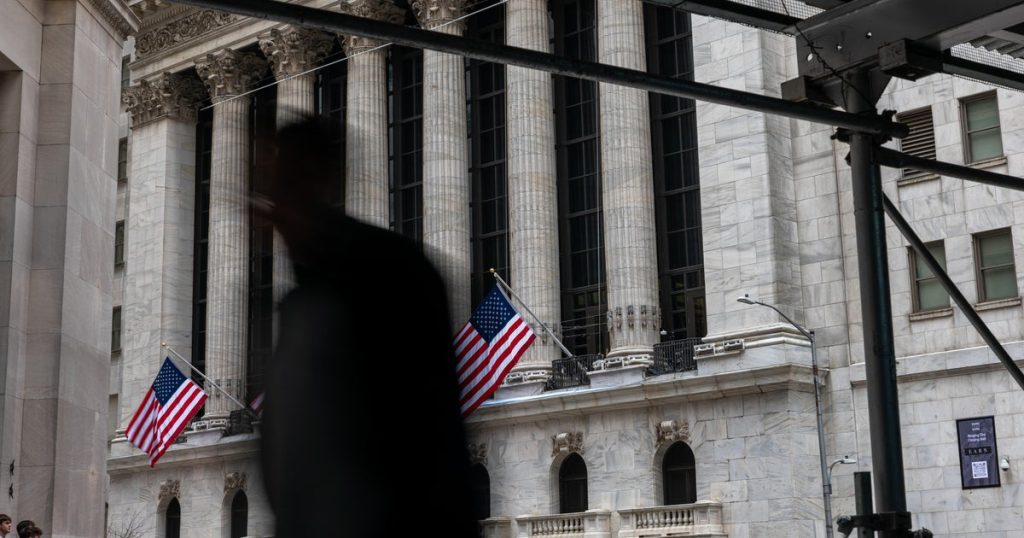The recent announcement of new tariffs by the Trump administration has caused significant turmoil in global financial markets. The Dow Jones Industrial Average saw a dramatic reduction of 1,473 points, a 3.5% drop, as investors grappled with the repercussions of the announced policies. With additional levies targeting nations that impose higher taxes on U.S. exports, experts are concerned about the potential for increased inflation and a slowdown in economic growth.
| Article Subheadings |
|---|
| 1) Trump’s Tariff Announcement and Immediate Market Reaction |
| 2) Impact on Global Markets |
| 3) Economic Forecasts Amidst Market Volatility |
| 4) Officials’ Confidence Versus Investor Concern |
| 5) Historical Context and Future Implications |
Trump’s Tariff Announcement and Immediate Market Reaction
On Wednesday, President Donald Trump unveiled a comprehensive set of tariffs, which included a baseline **10%** duty on all trading partners of the United States, with further increases for those countries that impose greater taxes on American exports. This proactive strategy is part of a broader initiative by the administration aimed at enhancing fairness in international commerce, encouraging domestic corporate expansion, and boosting federal revenue. Early trading on Thursday reflected investor anxiety, leading the Dow Jones Industrial Average to plummet by 1,473 points, or 3.5%. The market initially responded with alarm, reflecting fears surrounding the ramifications of heightened trade barriers.
Impact on Global Markets
The fallout of the tariff announcement extended well beyond U.S. borders, affecting markets across Asia and Europe. In the context of Asian markets, Japan’s Nikkei 225 index experienced a steep decline of 4% initially, eventually closing down by 2.8%. South Korea’s benchmark index, the Kospi, also reeled with a loss of 1.1%. In Europe, midday trading saw similar patterns with Germany’s DAX dropping 2.4%, France’s CAC 40 experiencing a loss of 2.7%, and the UK’s FTSE 100 falling by 1.5%. Investors worldwide are grappling with the uncertainty that such tariffs introduce, prompting concerns about retaliatory policies from other nations and potential escalations in trade tensions.
Economic Forecasts Amidst Market Volatility
As the market adjusts to these developments, analysts warn of potential economic ramifications, including rising inflation rates and reduced consumer and business spending. Solita Marcelli, Chief Investment Officer Americas at UBS Global Wealth Management, stated that the current climate is expected to keep uncertainties high, as investors reassess their growth forecasts for the U.S. economy. The S&P 500 index is already experiencing a significant downturn, currently down **7.3%** year-to-date, the Dow has decreased by **4.1%**, and the Nasdaq index has suffered a **13%** drop. Such shifts signal possible underlying weaknesses that threaten overall economic growth and business expansion.
Officials’ Confidence Versus Investor Concern
Despite evident investor unease, White House Press Secretary Karoline Leavitt expressed confidence in the administration’s economic strategies during a recent press briefing. In light of the adverse reactions in global financial markets, she urged Wall Street to place their trust in President Trump, highlighting the expectation that these economic policies will ultimately yield positive outcomes. Historically, markets have surged following favorable governmental policy changes. Following Trump’s re-election, there was an initial surge in stock prices, attributed to anticipations of tax cuts and deregulation. However, the recent shift in policy direction has led to skepticism among investors, especially following the announcement of new tariffs, which was viewed as an aggressive approach rather than a mere negotiating tactic.
Historical Context and Future Implications
The historical context of tariffs suggests that spikes in import taxes can have wide-reaching consequences on international economic relationships. Wealth managers like Sean Sun, a portfolio manager at Thornburg Investment Management, caution that markets may be underreacting to the real risks posed by these tariff changes. If these rates remain, the potential impact on global consumption, production, and trade could extend beyond immediate price hikes. Investors and businesses are closely monitoring these developments, anxiously anticipating how global consumption patterns might react and what retaliatory measures might emerge from affected nations.
| No. | Key Points |
|---|---|
| 1 | President Trump announced a baseline 10% tariff on all U.S. trading partners. |
| 2 | The Dow Jones Industrial Average fell by 1,473 points, reflecting investor anxiety. |
| 3 | Global markets in Asia and Europe mirrored the drop in U.S. markets. |
| 4 | Economic forecasts suggest rising inflation and a slowdown in consumer and business spending. |
| 5 | Analysts express concerns that markets are not fully accounting for the ongoing risks posed by these tariffs. |
Summary
The recent tariff announcements by the Trump administration have ushered in a period of uncertainty in financial markets, prompting significant declines across major indices. Investors are now faced with the challenge of navigating the potential repercussions of increased trade barriers, both domestically and internationally. As forecasts suggest possible inflationary pressures and slowdowns in economic growth, the administration’s assertions of confidence will be put to the test against the backdrop of an increasingly volatile global economy.
Frequently Asked Questions
Question: What are the implications of the new tariffs announced by President Trump?
The tariffs are intended to create fairer trade practices; however, they may lead to increased prices for consumers and retaliation from other countries, potentially leading to an economic slowdown.
Question: How have investors reacted to the tariff announcements?
Investors have reacted negatively, resulting in significant drops in stock prices across major indices, as fears of inflation and reduced consumer spending loom large.
Question: What might be the long-term effects of these tariffs on global trade?
In the long term, these tariffs could adversely affect international trade relations, raise prices globally, and hinder economic growth, depending on responses from other nations.


